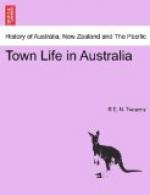The province is still under Crown Government, although there is a Legislative Council, two-thirds of the members of which are elected by L10 householders, which is yearly gaining power. The advent of Constitutional Government will depend entirely upon the progress of the colony; but at present it is far from being desirable, the elected members of the Council being distinctly the obstructive party, while the Governor and the Imperially appointed officials are the only persons who look beyond the squatting interest to that of the colony as a whole.
The politics of the country consist of discussions as to whether settlers should be bound to pay half the value of the fences a neighbour has erected or wishes to erect between them; whether the railway should be allowed to go through a certain square in the township of Guildford; whether police protection, at the expense of the whole colony, should be afforded to settlers in the outlying districts, who are exposed to attacks of natives. People living within hearing of St. Stephen’s can hardly imagine the virulence with which these petty questions are gone into, still less that for months they have formed the only topics of conversation. Liliput must, I feel sure, have been a far noisier place than Brobdingnag, and with the kindest feeling towards the most hospitable people in the world, I cannot forbear a smile at the recollections of the boredom I underwent on the subject of the Fencing Bill.
Reviewing Australian politics as a whole, one notices that whilst all the colonies are distinctly ‘Liberal’ in their ideas, the shades of colour vary from Whiggism in New South Wales and Queensland, to extreme Radicalism in Victoria, with South Australia as the exponent of the more sober Radicals. The two more important provinces have diverged considerably from each other, partly from sheer opposition, but chiefly from diversity of circumstances and constituents. Until recently, South Australia was content quietly to beat out its own little track; but the rapprochement between all the colonies, which increased facilities of communication have brought about, is yearly tending to lessen its individuality and to make it a mere copy of one or the other of its big neighbours.
In discussing constitutional questions it is well to remember that, although all the Australian constitutions are founded on analogy with the British, that analogy can easily be carried too far. To begin, the main functions of the Colonial Legislature, and the relations of the two Chambers towards each other, are for the most part written down in black and white, their constitutions allowing no room for the ’broadening down from precedent to precedent,’ which has enabled the British constitution to work comparatively so smoothly. The latter grew up naturally, the former were made to order. All parties in Australia are agreed to follow British precedent where none is provided in the Constitution Act; but there is a considerable




